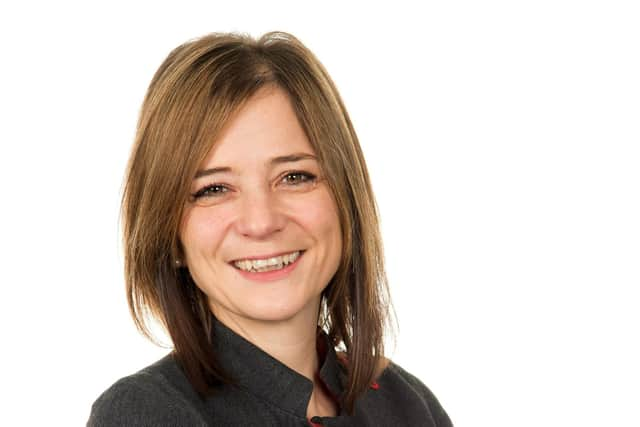The future of business success is about more than just profits - Clare Alexander comment
With a greater-than-ever focus on creating a wellbeing economy, many businesses are updating their culture and re-evaluating their purpose to put people, planet and profits on an equal footing. At the same time, we’re seeing an increased number of businesses become more democratic and community-focused through shared ownership and impact-led models.
It’s particularly apt to think about this paradigm shift following Employee Ownership Day on Friday, and in the midst of Co-ops Fortnight. These annual events bring a renewed focus to inclusive business models, but at Co-operative Development Scotland (CDS) we live and breathe them all year round.
Advertisement
Hide AdAdvertisement
Hide AdOperating as part of Scottish Enterprise, CDS works with Scotland’s three enterprise agencies to grow and support the inclusive business sector – mainly comprising employee-owned businesses and co-operatives.
For the uninitiated, an employee-owned business (EOB) is one where employees hold the majority of shares, either directly or through a trust. It’s a popular succession choice for exiting owners, allowing them to achieve a fair value for their business while safeguarding its future and rewarding employee loyalty with a meaningful stake in the company and a genuine say in how it’s run.
Co-operatives (or co-ops) are democratically run organisations owned and controlled by their members to meet their needs. Membership can be made up of employees, customers, communities and other businesses, such as suppliers or partners. They come in many forms including community, consortia and worker co-ops.
CDS has strong backing from the Scottish Government, which has committed to growing the number of EOBs to 500 by 2030. On launching the National Strategy for Economic Transformation earlier this year, Finance Secretary Kate Forbes recognised that “alternative business models such as co-operatives, social enterprises, and community-owned businesses can deliver strong outcomes on fair work and benefits to local communities”.


We recently commissioned a census of EOBs in Scotland, revealing that there were 195 at the end of March, including 28 workers’ co-operatives – and 146 of these are Scottish-registered, boasting combined turnover of £691 million and more than 5,350 employees.
Increased interest
The number of Scottish EOBs has since grown to more than 200, but we know we still have a long way to go, so we’re broadening our support and growing our team. We’re also widening our offer to co-ops, supporting more types both at start-up and once they’re established, and we’re already seeing growing interest in platform co-ops (those that operate via an online platform).
Scottish co-ops are also growing healthily, with Co-operatives UK 2021 data identifying 586 co-ops and an annual increase of 2.63 per cent. Impressively, Scotland boasted 13 per cent of new UK co-ops despite its 8 per cent population share.


The advantages of this for Scotland’s people and places are well documented, but the most interesting thing you may not know about EOBs and co-ops is that they actually punch well above their weight in terms of business performance.
Advertisement
Hide AdAdvertisement
Hide AdEvidence shows EOBs consistently outperform other business types on resilience during times of economic crisis. They tend to be more productive, creating fairer workplaces, greater staff engagement, and enhanced employee wellbeing.
Last year we commissioned a survey that revealed that 53 per cent of EOBs experienced steady or increased turnover during the pandemic, compared to just 20 per cent of non-employee-owned businesses. Results also revealed that 97 per cent of EOBs view job-protection as extremely or very important, with similar importance placed on paying the Living Wage (67 per cent), workplace equality (75 per cent), long-term organisational sustainability (88 per cent), and mental wellbeing (83 per cent).
Co-ops also have a proven track record for resilience. The Co-op Economy Report 2021 from Co-operatives UK showed that UK co-ops were four times more likely to survive, with just 1.5 per cent dissolving in 2020, compared to 6.5 per cent of businesses in general. Independent co-ops grew by 1.2 per cent despite the pandemic, with UK co-ops as a whole reporting a £1.1 billion increase in turnover.
Impact
Examples of co-ops we’ve worked with include Isle of Eigg Brewery in the Hebrides, which aims to create high-quality beer, a positive social and environmental impact, and local employment. It has 605 members, reaching beyond the island’s population for like-minded supporters.
Then there’s Jangling Space in Glasgow, which teaches community members to design, make, and sell their own glass products; and Scotland’s most remote pub, The Old Forge in Knoydart, where residents united to purchase and operate a vibrant, environmentally conscious, community-owned space.
EOBs we’ve worked with include Edinburgh-based contemporary furniture and interior design company Tangram, which transitioned in 2020 when owner Julian Darwell-Stone was considering retirement but wanted to ensure the business continued in its existing form for his “long-serving and incredibly loyal team.”
Last year, 30-year-old Highland-based Swansons Food handed more than 40 staff across Inverness, Nairn, and Elgin a stake in the business; and Midlothian-based IT firm Network ROI completed an employee buy-out in 2018 after receiving £1m funding from an alternative finance specialist.
As you can see, EOBs and co-ops span a huge range of sectors and industries, but all share a desire to put their employees and communities at the heart of what they do. They’re increasingly critical to Scotland’s competitiveness regionally, nationally, and internationally, and they make a significant contribution towards delivering a step-change in levels of productivity and innovation in a wellbeing economy.
Clare Alexander, head of CDS, Scottish Enterprise
Comments
Want to join the conversation? Please or to comment on this article.
